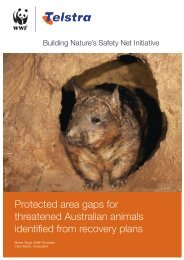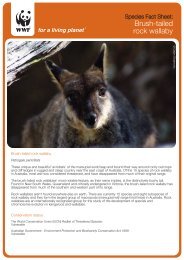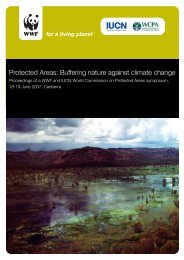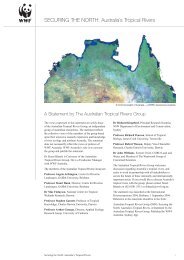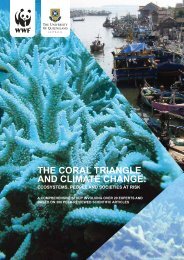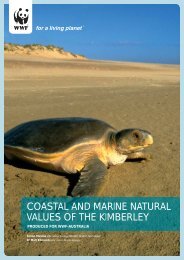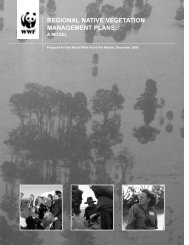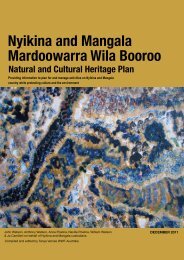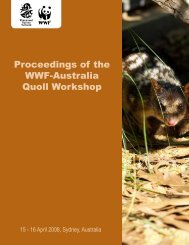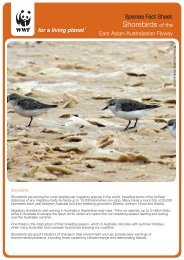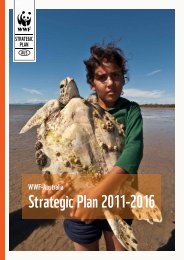Indigenous Peoples and Conservation Organizations
Indigenous Peoples and Conservation Organizations
Indigenous Peoples and Conservation Organizations
Create successful ePaper yourself
Turn your PDF publications into a flip-book with our unique Google optimized e-Paper software.
86 The Sirionó in Bolivia<br />
these topics in workshop after workshop. Both<br />
CIDDEBENI <strong>and</strong> CIDOB have emphasized the<br />
importance of holding training sessions in the<br />
community <strong>and</strong> opening them to everyone who is<br />
interested. In the past, individuals have left<br />
Ibiato for specialized training from NGOs, but<br />
what they have learned has been closely held.<br />
Perhaps this mirrors the Sirionó concept of ownership,<br />
with knowledge belonging to the person<br />
who finds <strong>and</strong> uses it. Opening information<br />
flows is essential if the community is to build the<br />
consensus that is needed to collectively manage<br />
communal resources.<br />
Second, the training must be conducted as a dialogue<br />
rather than a monologue. In discussing the<br />
community’s options <strong>and</strong> how environmental<br />
issues affect potential gains <strong>and</strong> losses, it is<br />
imperative to avoid jargon. CIDOB’s experience<br />
in several Bolivian communities is that indigenous<br />
people will rarely ask for clarification of<br />
terms that they do not underst<strong>and</strong> if they sense<br />
the purpose of the encounter is not a two-way<br />
exchange of information. Like most nonspecialists,<br />
in fact, they simply stop listening. Even<br />
though both sides in Ibiato may speak Spanish,<br />
the technician must listen carefully if he or she<br />
hopes to speak clearly <strong>and</strong> be understood in turn.<br />
To further this process, it makes sense to use<br />
bilingual training materials. Local participants<br />
may all read <strong>and</strong> write Spanish, but they are more<br />
likely to take ownership of the material when it is<br />
also expressed in Sirionó. They feel it helps keep<br />
their language alive <strong>and</strong> provides a quick litmus<br />
test of whether or not the materials are relevant.<br />
Third, it is important to communicate with local<br />
leaders because they are often the gatekeepers of<br />
their communities. Of course outsiders are not<br />
always in the best position to judge who the leaders<br />
are. This is why starting activities in new<br />
areas as small research projects makes good<br />
sense. It allows both partners to learn more about<br />
one another, find out what the real issues are, <strong>and</strong><br />
build the trust needed to devise solutions.<br />
Finally, issues <strong>and</strong> concepts should be framed in<br />
ways that touch a local chord. Abstractions must<br />
be grounded, wherever possible, in local realities<br />
<strong>and</strong> values. Take the question of biodiversity.<br />
The Sirionó underst<strong>and</strong> that their resource base is<br />
threatened. People know they are lucky to still<br />
have game, <strong>and</strong> are concerned that harvests seem<br />
to be shrinking since the first measurements several<br />
years ago. They have heard others complain<br />
about how poor the hunting is in neighboring villages,<br />
<strong>and</strong> have seen with their own eyes the<br />
changes to the l<strong>and</strong>scape around them. They<br />
realize that they inhabit a complex system of<br />
resources <strong>and</strong> are looking for synergies that multiply<br />
returns rather than more intensive exploitation<br />
that cashes out a resource. They were the<br />
ones who broadened a reforestation project<br />
beyond hardwoods for export, to hardy native<br />
species that would provide a food source for<br />
game as well as firewood for local markets. The<br />
trade-off being worked out between bee <strong>and</strong> firewood<br />
producers is also based on multiple use of<br />
resources. <strong>Indigenous</strong> peoples have usually<br />
relied on a variety of sources for subsistence, <strong>and</strong><br />
they seek to add income-generating activities to<br />
the mix. It is a lifestyle that mirrors <strong>and</strong> depends<br />
on the biodiversity around them.<br />
Recently a workshop held in Ibiato to design the<br />
wildlife census introduced a larger notion of biodiversity<br />
conservation by talking about the<br />
immense Amazonian Corridor of which the<br />
Sirionó are a tiny <strong>and</strong> marginal part. Some of the<br />
fish that breed in local waters during the rainy<br />
season work their way much farther downstream.<br />
And the jabiru stork that arrives to feed on them<br />
is a mythic bird for the Xavante Indians in Brazil<br />
hundreds of miles to the north. Workshop participants<br />
expressed pride in having the opportunity to<br />
play an important role in keeping this system<br />
functioning, especially since changes to the l<strong>and</strong><br />
around Ibiato may make a Sirionó TCO a vital<br />
isl<strong>and</strong> for migrating species. Still, they wondered<br />
what direct benefits that role might confer.<br />
One answer comes from an idea being tried elsewhere<br />
by other indigenous groups. Word has filtered<br />
into Ibiato about ecotourism, <strong>and</strong> the<br />
Sirionó quiz anyone who seems to know more<br />
about it. They like the idea that the l<strong>and</strong> could<br />
be left much as it is <strong>and</strong> still provide the community<br />
with the basic elements of a good life.<br />
And there are reasons for finding the idea plausible.<br />
The international airport at Trinidad is<br />
accessible, the pre-Columbian mounds are archeological<br />
sites available for exploration, wildlife<br />
can be viewed at water holes, <strong>and</strong> the people of<br />
Ibiato generally like visitors <strong>and</strong> have the language<br />
skills to communicate in Spanish. There



